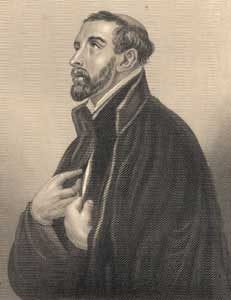
Saint Francis Xavier (1506-1552 AD)
Feast Day: December 3
Woe to me if I do not preach the Gospel
We have visited the villages of the new converts who accepted the Christian religion a few years ago. No Portuguese live here—the country is so utterly barren and poor. The native Christians have no priests. They know only that they are Christians. There is nobody to say Mass for them; nobody to teach them the Creed, the Our Father, the Hail Mary and the Commandments of God’s Law.
I have not stopped since the day I arrived. I conscientiously made the rounds of the villages. I bathed in the sacred waters all the children who had not yet been baptized. This means that I have purified a very large number of children so young that, as the saying goes, they could not tell their right hand from their left. The older children would not let me say my Office or eat or sleep until I taught them one prayer or another. Then I began to understand: The kingdom of heaven belongs to such as these.
I could not refuse so devout a request without failing in devotion myself. I taught them, first the confession of faith in the Father, the Son and the Holy Spirit, then the Apostles’ Creed, the Our Father and Hail Mary. I noticed among them persons of great intelligence. If only someone could educate them in the Christian way of life, I have no doubt that they would make excellent Christians.
Many, many people hereabouts are not becoming Christians for one reason only: there is nobody to make them Christians. Again and again I have thought of going round the universities of Europe, especially Paris, and everywhere crying out like a madman, riveting the attention of those with more learning than charity: “What a tragedy: how many souls are being shut out of heaven and falling into hell, thanks to you!”
I wish they would work as hard at this as they do at their books, and so settle their account with God for their learning and the talents entrusted to them.
This thought would certainly stir most of them to meditate on spiritual realities, to listen actively to what God is saying to them. They would forget their own desires, their human affairs, and give themselves over entirely to God’s will and his choice. They would cry out with all their heart: Lord, I am here! What do you want me to do? Send me anywhere you like—even to India.
St. Francis Xavier was a Jesuit priest; it can be said that he is one of the greatest missionaries after St. Paul and regarded as the patron saint of foreign missions. He is also known as the apostle of India and Japan. St. Francis Xavier was born on October 7, 1506 in Navarre, Spain. He studied at the University of Paris and later taught at the University of Paris. The words that continue to occupy his mind was: “What profit would there be for one to gain the whole world and forfeit his life?” (Mt. 16:26)
He met St. Ignatius of Loyola, and with the enthusiasm of his new friend, Francis deepened his love for Christ. He then joined Ignatius to form the Society of Jesus in 1534.
In 1537, Francis was ordained a priest in Venice, then he transferred to Lisbon, where he took a boat to India and landed in Goa on the west coast of India. For the next decade, he was committed to bring faith to the Indian, Malaysian and Japanese people.
No matter where he went, he lived with the poorest people and shared their food and life needs; he gave countless hours of service to the sick and the poor, especially those with leprosy. He often had no time for sleep, but from his letters, he was always full of joy.
After he traveled through the Malaysian Islands, he went up to Japan to spread the Gospel. He studied Japanese in Japan and preached among the local gentry; he baptized them and established many mission centers for those who followed him. While he was in Japan, his greatest wish was to go to China and to preach in China, but this dream never materialized because before he arrived in China, he died in Shangchuan Island on December 3, 1552.
Francis Xavier was canonized a saint in 1622 by Pope Gregory XV, and was named by Pope Pius XI, together with St. Therese of Lisieux, as co-patron saint of foreign missions in 1927.